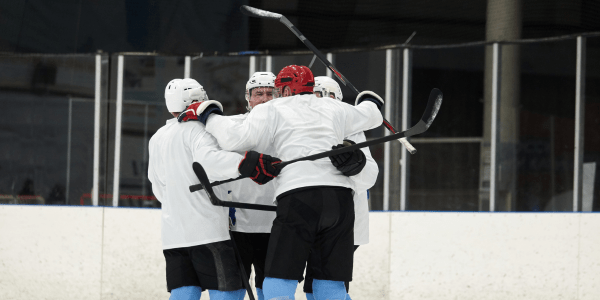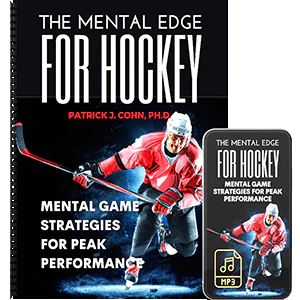
Have you Heard that, “You Make your Own Luck?”
Making your own luck is a matter of looking for opportunities and making the most of those opportunities.
For example, if you played on the first line the previous year but had your playing time significantly reduced for the current season, one option is to sulk, complain, and talk about how unlucky you are.
The second option is to look for other ways to contribute, expand your minutes, and further develop your game. You could consider a position change if your team lacks in a particular area or work on your penalty-killing skills.
This type of mindset is referred to as a growth mindset. A player with a growth mindset is committed to improvement and finding solutions.
Hockey players with a growth mindset can adapt to their circumstances and add greater value to their team.
Hockey Players with a Growth Mindset:
* Have a continual focus on sharpening their current skills and developing new skills. For example, if your strength is your skating, continue to work on your speed.
If you recognize an opportunity to increase your team contribution by adding defensive skills to your game, you can implement extra defensive drills into your practice regimen.
* Have clear short-term and long-term goals. These players have a vision for the player they desire to be and a plan of attack to achieve their objective.
* Are flexible and open to change and new experiences. Adaptability is a major characteristic of a growth mindset. If needed, they are willing to switch positions.
* Have an optimistic outlook and are motivated by challenges. A player with a growth mindset doesn’t shy away from challenges and is committed to continuous improvement. When playing time is reduced, they continue to work hard in training and practice, believing their efforts will eventually pay off.
* Take the initiative to look for new opportunities. In other words, hockey players with a growth mindset don’t wait for things to happen; they make them happen. These players have positive conversations with their coaches and seek advice on improving mentally and physically.
Taking advantage of opportunities involves a combination of awareness, preparation, and action.
Philadelphia Flyers 7-year veteran Travis Sanheim is the team’s leading scorer early in the 2023-24 season. Through 14 games, Sanheim has 14 points (two goals, 12 assists). Last year, in 81 games, Sanheim had a total of 23 points (7 goals and 16 assists).
Sanheim said the key to his improved offensive output was finding new ways to contribute and increase his value as a player.
SANHEIN: “There’s more opportunity. I want to take advantage of that this season. I think that was one of the main things in the summer, that you see opportunity, and it makes you excited. For the first time probably in my career, some different spots are available. I want to take advantage of that.”
Opportunities create excitement, and excitement leads to motivation. When you look for opportunities to expand your skillset and contribute to your team, you will put in the mental and physical work to grow into your potential.
At the start of each week, ask yourself, “What can I improve upon, and how will that improvement lead to greater opportunity?”
Make sure your answer is specific and detailed. When you have a clear vision, you can create a detailed plan and the steps necessary to achieve your objective.
Related Articles on Hockey Mental Game:
- Overcoming Momentum Changes in Hockey
- How to Play with Intensity on Your First Shift
- How to Handle Conflict with Your Coach
*Subscribe to The Sports Psychology Podcast on iTunes
*Subscribe to The Sports Psychology Podcast on Spotify
The Mental Edge for Hockey

The Mental Edge for Hockey teaches you proven and simple mental game strategies so you can overcome fear of failure, lack of confidence, slumps or poor composure, take your practice game to competition, and boost your confidence in hockey. You learn simple, actionable mental game strategies to help you perform at your peak!
I’ve worked with athletes for 30 plus years – and know the top challenges that undermine performance when you perform in games. Now you can tap into my expertise and experience in coaching hockey players on the mental game.
In this program, you’ll learn the TOP 10 mental training lessons for hockey players – the same strategies I teach one-on-one athletes I coach on the mental game. My clients pay thousands of dollars for personal coaching, but now you can have the same strategies to improve your mental game – at a fraction of the price.
Leave a Reply